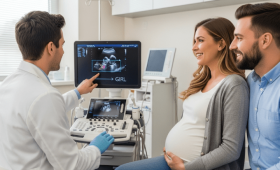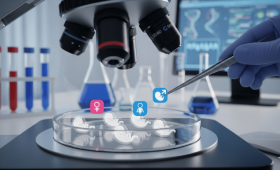Cyprus is a popular destination for IVF (In Vitro Fertilization) treatments. It has become a leading center in Europe due to its advanced IVF centers, high success rates, world-class medical care and affordable cost of treatments.
The IVF clinics in Cyprus have adopted the latest strategies and techniques for performing successful IVF treatments. The IVF clinics are staffed by experienced and competent medical professionals with state-of-the-art facilities. The fertility cards offered by the clinics guarantee successful results and free treatments in case of minor failures.
The clinics are equipped with modern laboratories and operating rooms with advanced imaging technology. They offer treatments such as IVF, ICSI, egg donation, frozen embryo transfer and sperm donation. These clinics provide personalized care and guidance throughout the course of treatment.
The IVF clinics in Cyprus offer both natural-cycle IVF and IVF with donor eggs. The procedures are done in a safe and comfortable environment with minimal discomfort to the patient. The embryos are examined thoroughly before implantation, thereby ensuring the highest success rate.
Before the start of any treatment plan, the IVF clinicians in Cyprus will assess the patient’s infertility factors which may vary with different couples. They will then design an individualized treatment plan that addresses these factors.
The IVF clinics of Cyprus provide comprehensive end-to-end IVF services. While the cost of IVF treatments in the island depends on the clinic and the patient’s condition, the overall cost could be up to 45% cheaper than the average cost in western countries. This makes it a more attractive option for patients seeking affordable but quality IVF treatment abroad.
In Cyprus, the culture and amazing weather are an added bonus. Patients can relax and enjoy a pleasant holiday while receiving their medical treatment. The IVF clinics in Cyprus are committed to making your experience as comfortable and stress-free as possible, thereby increasing the chances of successful treatment. So if you are looking for an IVF clinic, then Cyprus should be the top of your list.
If you want to contact an IVF center with high success groups, just send us a message. We will provide you with free consultation. We are one of the IVF centers with the highest success rates in the world.
What is the cost of IVF treatment in Cyprus?
The costs of IVF treatment in Cyprus vary depending on the method used, the medications, and additional treatments (e.g., genetic testing, donation). The fact that it can be more affordable than in Turkey and many European countries has made the island a popular destination. Costs generally cover the basic treatment package, medications, and doctor consultations. However, extra expenses like accommodation and flight costs should also be added to the budget. The best approach is to contact the clinic you choose directly for a clear understanding of the prices.
Why are IVF clinics in Cyprus so popular?
Cyprus is a popular IVF hub due to its high success rates, fewer bureaucratic obstacles, and the legality of certain procedures like donation, which are not allowed in some other countries. Direct flights from many countries, modern medical technologies, experienced doctors, and personalized treatment plans are also among the reasons for its popularity. The warm climate and hospitable environment, which make the treatment process less stressful for patients, are also a significant factor.
How is IVF with egg donation performed?
Egg donation is an option for women who cannot get pregnant with their own eggs. In this process, eggs from a young and healthy donor are fertilized with the partner’s sperm in a laboratory, and the resulting embryos are transferred to the expectant mother’s uterus. Donor selection is done meticulously, considering criteria such as blood type and physical characteristics. This method is a promising solution, especially for women in menopause or those with a low ovarian reserve.
How is IVF with sperm donation performed?
Sperm donation is a method used when the male partner has no sperm production or poor sperm quality. In this process, the expectant mother’s eggs are fertilized with sperm from an anonymous donor in a laboratory. The resulting embryos are then transferred to the expectant mother’s uterus to attempt pregnancy. Donor sperm is sourced from approved banks that are tested to high standards and confirmed to be genetically healthy. The treatment process is planned according to personal needs.
What is embryo donation and how is it applied?
Embryo donation is a preferred method when the reproductive cells of both the prospective mother and father cannot be used. In this process, healthy embryos remaining from another couple are thawed and transferred to the recipient mother’s uterus. Since embryo donation uses an embryo that is genetically from both an egg and a sperm donor, it is an effective method that increases the chances of pregnancy. This treatment is an option, especially for couples who have had multiple unsuccessful IVF attempts.
What are the legal age limits for IVF treatment in Cyprus?
The legal age limits at IVF clinics in Cyprus are generally flexible. The upper age limit for women to start treatment is typically 50, but some clinics may treat women up to 55. Age limits can be extended with the use of donor eggs and sperm. However, each clinic has its own age policies and health conditions. Therefore, it is important to consult with the relevant clinic and evaluate your personal situation before starting treatment.
What are the success rates of IVF treatment in Cyprus?
The success rates of IVF treatment in Cyprus are quite high, especially for young patients and with donation methods. Success rates vary according to the patient’s age, the cause of infertility, and the treatment applied. On average, success rates for women under 35 can be around 60-70%, while with egg donation, these rates can go up to 80%. It is useful to examine the current statistics of the clinics to get accurate information about success rates.
How long does the treatment process take?
The IVF treatment process varies depending on the patient’s condition and treatment protocol. Generally, the treatment process is completed within 15-20 days, including the initial consultation and preparation stages. Remote monitoring and preparations can be done before coming to Cyprus for treatment. This can shorten the patient’s stay on the island and make the treatment process more manageable.
How long do we need to stay in Cyprus for treatment?
The duration of stay in Cyprus for treatment is generally set at 15-20 days. This period includes all stages such as egg retrieval, fertilization, and embryo transfer. Some clinics can reduce the duration of stay on the island to 7-10 days by organizing the preparation processes that patients can do in their home country. During this time, the patient and their partner can complete their treatment and also have a chance to rest.
What are the accommodation and transportation options?
IVF clinics in Cyprus generally provide support for patients’ accommodation and transportation needs. They have agreements with hotels or apartments. Clinics can arrange airport transfers and transportation between the hospital and the place of accommodation during the treatment period. Patients can also arrange their own accommodation, but the packages offered by the clinic are usually more practical and comfortable.
What tests and analyses are required?
Before starting treatment, a series of tests and analyses are requested from the couple. Women are asked for hormonal analyses (FSH, LH, E2, AMH), a hysterosalpingogram (HSG), and ultrasound, while men are asked for a sperm analysis (spermiogram). These tests are necessary to determine the cause of infertility and to create the most suitable treatment plan. Completing all necessary tests in advance speeds up the treatment process.
What should be considered before starting treatment?
Before starting treatment, it is important to adopt a healthy lifestyle and stay away from alcohol and cigarettes. Attention should be paid to a sufficient and balanced diet, regular sleep, and avoiding stress. Due to the financial and emotional burden of the treatment, it is also necessary to be psychologically prepared. Additionally, having all medical reports and test results up-to-date and complete makes the process easier.
How is the egg retrieval procedure performed, and is it painful?
Egg retrieval is a short operation performed under light anesthesia with the guidance of an ultrasound. The patient does not feel any pain or discomfort during the procedure. It usually takes 15-20 minutes, and the patient is discharged on the same day. It is normal to feel mild cramping and bloating after the procedure. Painkillers recommended by the doctor can alleviate this condition.
How is the embryo transfer procedure performed, and how long does it take?
Embryo transfer is one of the most important and painless stages of IVF treatment. During the procedure, embryos are placed in the uterus with the help of a thin catheter. It does not require anesthesia and is usually completed within 10-15 minutes. After the procedure, the patient can return to their daily life after resting for a few hours. This stage aims to maximize the chances of pregnancy.
Is pain or discomfort felt during treatment?
A minimal level of discomfort may be felt during IVF treatment. Mild pain at the injection site, cramping, and bloating after egg retrieval are common. However, the treatment is generally a painless process. Clinics take all necessary precautions to ensure the comfort of patients and offer medications for pain control.

How should nutrition be considered during the treatment process?
A healthy and balanced diet is of great importance during the treatment process. Plenty of protein, fresh vegetables, fruits, and whole-grain products should be consumed. It is recommended to stay away from processed foods, excessive sugar, caffeine, and alcohol. Drinking plenty of water keeps the body hydrated and supports blood flow to the reproductive organs. Getting support from a dietitian can be beneficial.
What is the effect of smoking and alcohol consumption on treatment?
Smoking and alcohol consumption negatively affect reproductive health in both women and men. Smoking lowers egg and sperm quality, reduces the chance of pregnancy, and can lead to miscarriage. Alcohol can disrupt hormonal balance. It is essential to completely quit smoking and alcohol for a successful treatment and a healthy pregnancy.
Is sexual intercourse forbidden during treatment?
Sexual intercourse may be forbidden during certain stages of IVF treatment, such as ovarian stimulation and egg retrieval. Due to the enlargement of the ovaries, sexual intercourse can be painful and carry risks like ovarian torsion. Your doctor will give you clear instructions on which stages of the treatment you should avoid sexual intercourse.
In which cases is IVF treatment recommended?
IVF treatment is recommended in cases of unexplained infertility, blocked fallopian tubes, low sperm count or quality in men, endometriosis, and polycystic ovary syndrome. In cases where other treatment methods have failed, IVF is seen as the most effective solution.
What are the risks and side effects of IVF treatment?
Common side effects of IVF treatment include mild pain at the injection site, bloating, and mood swings. One of the most important risks is ovarian hyperstimulation syndrome (OHSS). With modern treatment methods and dosage adjustments, this risk has been minimized. There is also a risk of multiple pregnancies, but this can also be controlled by the number of embryos transferred.
What should be considered after treatment?
After embryo transfer, heavy exercise and excessive physical activity should be avoided. It is important to rest a lot, eat healthily, and stay away from stress. Regularly taking the medications recommended by the doctor and following the specified appointments increases the chances of pregnancy.
What should be done if the treatment is unsuccessful?
An unsuccessful IVF treatment can be discouraging, but it is important to remember that this situation is common. In the case of failure, you should evaluate the situation with your doctor and decide on the next step. A different treatment protocol, additional tests, or lifestyle changes may be recommended for the next attempt.
What are the solutions for repeated unsuccessful IVF attempts?
Repeated unsuccessful attempts may require additional tests and treatments. In this case, the genetic makeup of the embryos can be examined with PGT/PGS (Preimplantation Genetic Diagnosis/Screening). Additionally, an examination of the uterine lining (endometrium), immunological tests, and supportive treatments like acupuncture can also be tried. A personalized treatment plan should be created for each individual in all cases.
What is PGT/PGS (Preimplantation Genetic Diagnosis/Screening)?
PGT/PGS is the genetic examination of embryos before embryo transfer. PGT is performed to detect specific genetic diseases, while PGS screens for chromosomal abnormalities (aneuploidy) in the embryos. These tests help in selecting genetically healthy embryos, thereby increasing the chances of pregnancy and reducing the risk of genetic diseases being passed on to the baby.
Should psychological support be sought during the treatment process?
The IVF process can be both physically and emotionally challenging. Therefore, it is very beneficial to seek psychological support during the treatment process. A counselor or therapist can help you cope with stress, manage emotional fluctuations, and communicate with your partner. It should be remembered that psychological health plays an important role in treatment success.
How is sperm analysis and preparation performed?
Sperm analysis (spermiogram) is performed to evaluate male reproductive health. Factors such as sperm count, motility, and morphology are examined. For IVF treatment, sperm are put through a special process in a laboratory. The healthiest and most motile sperm are selected and prepared for egg fertilization.
What is frozen embryo transfer?
Frozen embryo transfer (FET) is the process of thawing and placing embryos that were left over and frozen from a previous IVF treatment into the mother’s uterus. This method is less invasive, less costly, and less stressful as it does not require a new egg retrieval and fertilization process. The treatment success rates are also close to those of fresh transfers.
Is gender selection legal?
Gender selection with the PGT method is legal in Cyprus. This is an important option, especially for couples who want to achieve family balance or for families who carry sex-linked genetic diseases. Gender is determined during the genetic examination of the embryos, and the transfer procedure is performed accordingly.
How to choose an IVF clinic?
When choosing an IVF clinic, factors such as success rates, the experience of the doctors, the technology used, patient reviews, and the scope of services offered by the clinic should be considered. It is very important for couples to choose a clinic where they feel comfortable, can communicate, and can trust. Consulting and comparing more than one clinic if possible helps in making the best decision.


